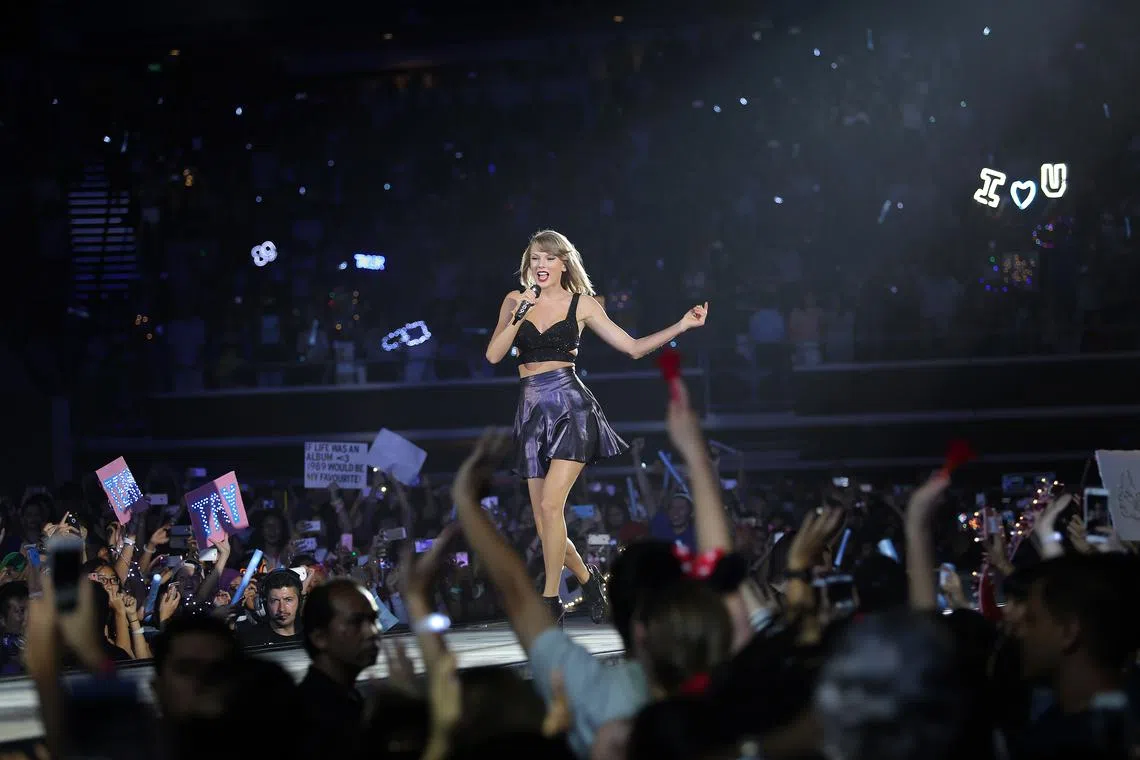Call it Swiftlation: Pop stars could be powering inflation as concert prices surge
Sign up now: Get ST's newsletters delivered to your inbox

A Taylor Swift concert in Singapore in 2015. Concert tickets have surged in price to the point where economists are noticing.
PHOTO: ST FILE
LOS ANGELES/GLASTONBURY – Call it Beyflation. Or maybe Swiftflation.
The cost of certain goods is retreating in some places, but that does not include live music. Concert tickets have surged in price to the point where economists are noticing.
Fans are shelling out a fortune for tickets to see the world’s biggest music acts, including names like Taylor Swift and Bruce Springsteen, who have not toured for years. And while few doubt the star power of Beyonce live, people were not factoring her into national inflation figures until now.
“People are willing to splurge because they know they will get quality content, plus who knows when or if she will do another tour after this one,” said London-based Beyonce fan Mario Ihieme, referring to the singer’s concerts.
Britain’s recreation and culture prices rose 6.8 per cent in the year to May, their fastest in 30 years, with the largest effect from cultural services, “particularly admission fees to live music events”.
Event prices in British inflation data are based on when shows take place, not when tickets are bought. But with different artistes performing every month, it is hard to compare one with the other, a spokesman for the Office for National Statistics said.
“The (subjective) quality of music artistes emphasises how difficult it is to calculate a ‘clean’ price increase,” said UBS Global Wealth Management chief economist Paul Donovan.
“And for UK inflation, the pressures may persist,” he added, noting a string of British gigs by singer Harry Styles in June.
A perusal of ticket purchasing sites makes the sticker shock clear. On reseller Stubhub, the cheapest seat for a July Taylor Swift show in Seattle is US$1,200 (S$1,600); tickets for an August show in Mexico City cost US$500 each.
But with live music just a subset of overall entertainment costs, which account for a smaller part of consumer spending than housing or food, some questioned the idea that concert prices could have an appreciable effect on inflation.
Mr Andy Gensler, executive editor of Pollstar, a publication that tracks the global concert industry, called it a “ridiculous assertion” that Beyonce‘s shows would affect inflation. While ticket prices had increased, he said, midyear figures had not shown an appreciable rise since May 2022, when US inflation was 8.6 per cent.
With demand far exceeding supply, TD Cowen vice-president of equity research Stephen Glagola said prices for tickets on the secondary market had soared to an average 75 per cent to 100 per cent above face value.
The United States Labour Department does not specifically measure inflation for concert prices, but the inflation rate for live performing admission events is currently 2.6 percentage points more than US headline inflation. This gap has increased this year as headline figures have declined.
Come together
Across Asia, crowds are flocking to see marquee names like Bruno Mars, Coldplay and the Backstreet Boys.
“Had it not been for the gig, I wouldn’t have travelled,” said Mr Fairuz Zahari, 36, from Malaysia, who has visited numerous countries for concerts, most recently Ed Sheeran in Australia.
In India, fans were happy to pay a premium for quality entertainment, according to Mr Owen Roncon, chief of business for Live Entertainment at BookMyShow.
“The average ticket price for the Backstreet Boys DNA World Tour in India was between 7,000 rupees and 8,000 rupees (between S$115 and S$132) – which is a very healthy growth,” he said, referring to the concert in May.
A recent survey from US event management company Eventbrite showed that 80 per cent of consumers wanted to go out as much or more in 2023, even as fans endure the cost and difficulty of securing tickets to big events.
Live Nation Entertainment chief executive Michael Rapino said in May that ticket sales rose 41 per cent in the first quarter, with prices up by double digits.
In Britain, about 150,000 music fans paid £340 (S$585) for a ticket to June’s Glastonbury Festival to see Elton John and hundreds of other acts. The event ended on Sunday.
Ms Beth Cook, a social media director from Leeds in northern England, said she expected to spend £100 a day at the five-day festival.
It was worth the expense, she said.
“When the pandemic was in full swing, I think everyone was in a really low mood, and we missed out on events like this, where people all come together.
“Now I think with things up and running, the people who can afford to are saving up to come to things like this because (these events) are amazing.” REUTERS


